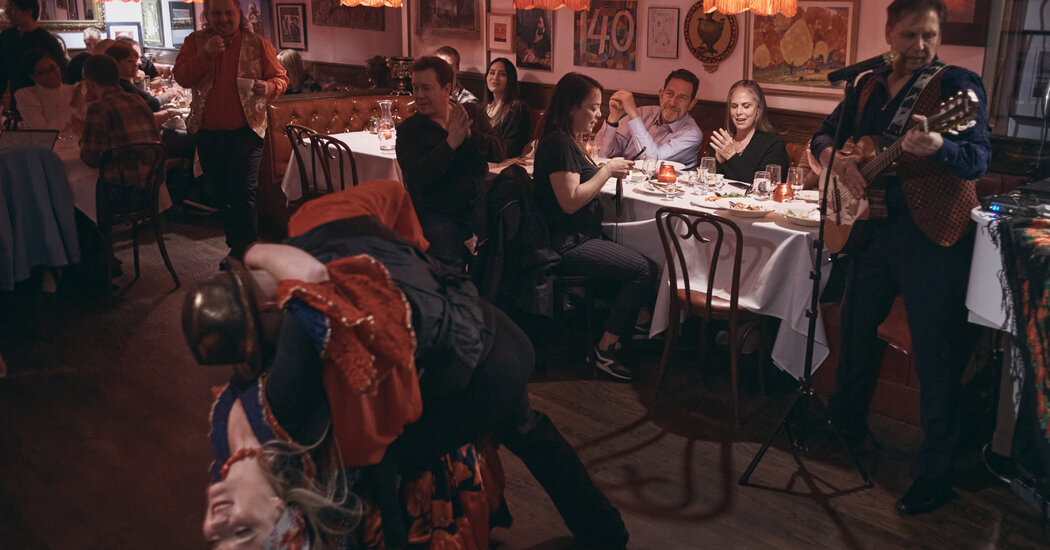Most owners are antiwar, and many of them are from Ukraine. But customer numbers are down all the same.
After Russia invaded Ukraine, Sveta, a small restaurant in the West Village known for its Instagram-friendly cocktails and hearty Russian fare like borscht, received a plethora of negative emails. One simply said, “Go Home.”
That would have been difficult for Sveta Savchitz, who is 64 years old and moved here from Ukraine in 1993. More than 25 years later, when she and her son, Alan Aguichev, opened the restaurant, they decided to market it as Russian because they thought it would have more name recognition. “It’s very similar cuisine-wise,” Mr. Aguichev said. “The main difference is whoever is cooking the food.”
These days, there’s name recognition, but not in a good way. So last week, they changed all the language describing Sveta online from “Russian” to “Eastern European.”
Russian restaurants in New York City have a public relations problem. Even though many of the owners are openly against the war, or are even Ukrainian, they are getting burned by reservation cancellations, social media campaigns and bad Yelp reviews at a time when restaurants, in general, are still reeling from the shutdowns and restrictions of Covid-19. Some places have even been vandalized.
“People have kicked in our door at night,” said Vlada Von Shats, the matron of Russian Samovar, a family-owned Russian piano bar in Midtown known for its flavored vodkas, caviar and red chandeliers. “We have people on the telephone calling us Nazis.”
Ms. Von Shats is Russian, and her husband is Ukrainian. Their three adult children, who are all involved in the restaurant, identify as both. Most of Samovar’s staff is from Ukraine; one of the musicians had a niece who died in the violence last weekend. Russian employees are vocal about their opposition to the invasion.
The restaurant is hosting a fund-raiser for Ukraine this week. It posted a blue and yellow flag on the door and a sign that says, “Stand by Ukraine. No War.”
Still, last Friday night, while the sidewalks outside were jammed with people going to Broadway plays, it only had a handful of customers. “This is usually prime time for us,” said Nicholas Von Shats, 29, an owner and manager. “The bar is usually at least 70 percent full by now.” One couple remarked that they had been wanting to come here for years, and it was the first time they could get a reservation.
Ms. Von Shats said reservations have dropped by 60 percent. “There is a lot of stigma out there,” she said. “These people don’t realize that we have nothing to do with Putin.”
Mariia Dolinsky, an owner of Tzarevna, a Russian restaurant on the Lower East Side, moved to New York City from Russia nine years ago. She calls the war “horrifying” and has put a sign out front in support of Ukraine. Still the customers have been calling, demanding to know which side of the war the owners of Tzarevna are on.
“I am Russian,” Ms. Dolinsky said. Her husband and co-owner, Ricky Dolinsky, is “half Taiwanese, half from New Jersey, and has Ukrainian grandparents.” Like many immigrants, they represent several countries. Even though they have been outspoken about their antiwar stance, bookings have been cut in half, the Dolinskys said, and walk-ins, which used to be abundant, are now scarce.
Russia-Ukraine War: Key Things to Know
A humanitarian crisis. Increasingly indiscriminate Russian shelling has trapped and traumatized Ukrainian civilians, leaving tens of thousands without food, water, power or heat in besieged cities of southern Ukraine and elsewhere.
Raphael Nieto, the owner of Daa! Dumplings, a shop that sells frozen pelmeni (Russian dumplings), is most concerned about online trolling. One review on Google said “Russian dumplings, following the Russian warship,” and then gave a one-star review. “It’s sad to see that people don’t even learn about the business before attacking us,” Mr. Nieto said.
Some New Yorkers are choosing to support the restaurants. Mr. Aguichev said that the landlord of Sveta recently asked to hold his daughter’s birthday there.
Neal Elkin, who works in finance, was at Russian Samovar on Friday night with his wife and a group of friends. “We just thought Russian businesses are probably being unfairly treated, and it would be the right thing to do to have dinner here,” he said. “There tends to be a lot of virtue signaling in how people behave these days, and to take it out on a business like this is unfortunate.”
Still, for the customers who do come in and want to talk about the war, Julia, a server at Samovar who requested her last name be omitted because she has family in Russia, takes the opportunity to teach them that not every Russian is supportive of President Vladimir V. Putin’s decisions and policies. “I am trying to show people that we aren’t what everybody thinks,” she said. “I can’t sleep. I am always checking the news. I think this war is the worst decision Putin ever made.”


























